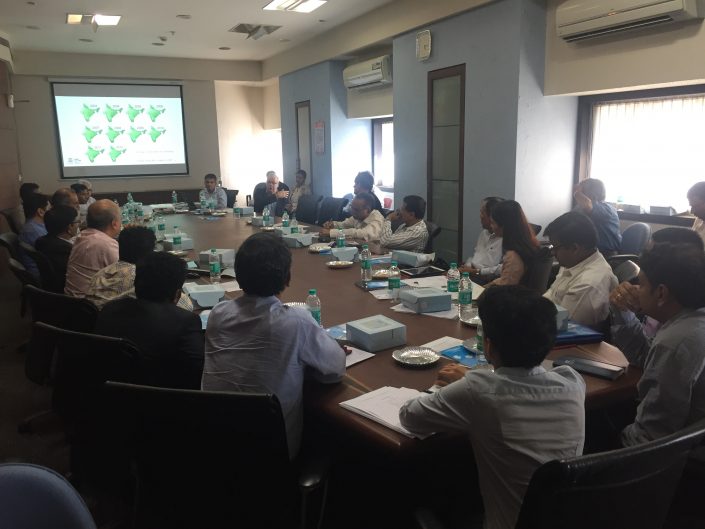Water accounting – an essential planning tool for agri-water sector recognized at the top-most policy-making authority in Maharashtra
 Mumbai, February 12, 2018 – 2030 WRG and the Maharashtra Water Resources Regulatory Authority (MWRRA) organized an important discussion on water accounting as a policy tool on 12 February 2018. The Maharashtra Multi-Stakeholder Platform is already working on Rain-fed-, Command Area- and Urban Industrial Water Security. Complementing the three workstreams in Maharashtra, 2030 WRG and a key participant in the MSP process, the Maharashtra Water Resources Regulatory Authority (MWRRA), brought to the forefront the essentials of water balancing and accounting through a discussion around River Basin Water Stewardship.
Mumbai, February 12, 2018 – 2030 WRG and the Maharashtra Water Resources Regulatory Authority (MWRRA) organized an important discussion on water accounting as a policy tool on 12 February 2018. The Maharashtra Multi-Stakeholder Platform is already working on Rain-fed-, Command Area- and Urban Industrial Water Security. Complementing the three workstreams in Maharashtra, 2030 WRG and a key participant in the MSP process, the Maharashtra Water Resources Regulatory Authority (MWRRA), brought to the forefront the essentials of water balancing and accounting through a discussion around River Basin Water Stewardship.
Water accounting efforts have been made by several stakeholders in India. The River Basin Stewardship and Water Accounting workshop included participation from leading not-for-profits and researchers focused on water issues in Maharashtra, namely, ACWADAM, CII, IIT-Bombay and WOTR. This workshop was attended by experts from MWRRA, Water Resources Department, The World Bank, Tata Sustainability Group, ITC, Tata Trusts, Urban Local Bodies, American Water Works Association to name a few.
The Confederation of Indian Industry (Vishnu Khedkar) and a leading private sector, ITC (K. Binoy), deployed an interesting tool using GIS-mapping, rainfall and river-flows and groundwater data in the Ghod Basin, in the proximity of the urban and industrial district of Pune. ACWADAM (Dr. Himanshu Kulkarni) presented their work related to groundwater and aquifer mapping techniques highlighting empirical evidence gathered through specific activities in Maharashtra. WOTR (Crispino Lobo) presented the essential links between water balance studies driven through community participation as a design tool to drive decisions related to cropping patterns in the rainfed areas of Maharashtra. IIT-Bombay (Prof. Milind Sohoni) presented the essentials of water balancing at the water-shed/villages that have been used in Maharashtra as a tool to make important investment decisions related to Government of Maharashtra’s more crop per drop project implementations.
While the Maharashtra-related bottom-up approaches were presented at the workshop, Prof. Wim Bastiaanssen from IHE-Delft presented the global best practice Water Accounting Plus (WA+), which uses satellite remote-sensing-based data to capture the water stress in the state of Maharashtra. WA+ tool informs the users and policy-makers on water accounting similar to financial accounting using fact-sheets, tables and maps. This methodology is already being deployed at the national level in India through 2030WRG’s engagement on “Blueprint for Water Accounting”, involving training of Central Water Commission, Central Groundwater Board, National Institute of Hydrology and others on the WA + methodology. As a result of the workshop in Mumbai, the Maharashtra MSP, in partnership with IHE-Delft, is planning a teaser WA+ training workshop for participants from Maharashtra during the coming quarter.
Further reading:
Maharashtra Water Multi-Stakeholder Platform Steering Board
Presentations made at the River Basin Stewardship and Water Accounting Workshop of 12 February 2018
